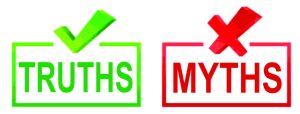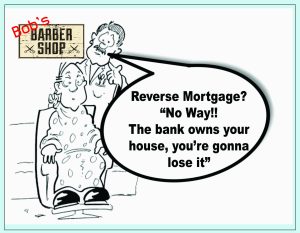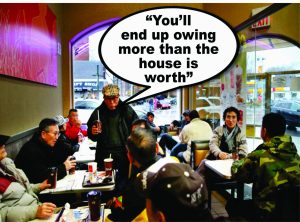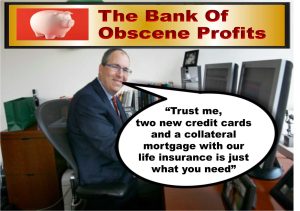 A number of myths and misconceptions about reverse mortgages have developed over time, mainly as a result of some bad actors from the past who offered a similar product. Mostly the misinformation tends to be spread by ill-informed ‘luminaries’ without any basis in fact. It is very important, therefore, that people understand the facts about reverse mortgages today, so they can determine if this is the right product for them and their families.
A number of myths and misconceptions about reverse mortgages have developed over time, mainly as a result of some bad actors from the past who offered a similar product. Mostly the misinformation tends to be spread by ill-informed ‘luminaries’ without any basis in fact. It is very important, therefore, that people understand the facts about reverse mortgages today, so they can determine if this is the right product for them and their families.
Despite the amazing power of reverse mortgages to provide financial flexibility to 55+ Canadian homeowners and their families, there remain a number of misconceptions about this product. Following are a few examples:
 Myth #1: The bank owns the home.
Myth #1: The bank owns the home.
- Truth: Some people are afraid they will lose ownership of their property if they take out a reverse mortgage. The homeowner always maintains title ownership and control of their home, and they have the freedom to decide when and if they’d like to move or sell.
 Myth #2: Those with a reverse mortgage will owe more than their house is worth.
Myth #2: Those with a reverse mortgage will owe more than their house is worth.
- Truth: Conservative lending practices allow clients to take a maximum of 55% (33% on average) of the home’s appraised value. In fact, 99% of Reverse Mortgage clients have equity remaining in the home when the loan is repaid. Because of the home equity guarantee, if you take out a reverse mortgage, you and your family will never owe more than the fair market value of your home at the time you leave the home. If the mortgage balance were to ever exceed the home value, the lender absorbs the loss. But the best part is, if your home price goes up, you keep that value.
Myth #3: Reverse Mortgages are too expensive because the rates are high.
- Truth: Reverse Mortgage Rates are modestly higher than regular mortgages because there are no payments required and there is no immediate expectation of the loan being repaid for several years.
Myth #4: A reverse mortgage is a solution of last resort.
- Truth: Many financial professionals recommend a reverse mortgage because it’s a great way to provide financial flexibility. Since it’s tax-free money, it allows retirement savings to last longer.
Myth #5: A Home Equity Line of Credit (HELOC) is a better option.
-
 Truth: HELOCs are a good short-term borrowing option for people who can pay the interest and loan in the near future. However, HELOCs are callable loans and there exists significant risk of non-renewal or cancellation. In comparison, a reverse mortgage is a long-term financial solution that won’t be called based on economic changes such as interest rates increasing, property values decreasing, or a change in the homeowner’s income. Also, money from a reverse mortgage provides the ability to prolong retirement savings.
Truth: HELOCs are a good short-term borrowing option for people who can pay the interest and loan in the near future. However, HELOCs are callable loans and there exists significant risk of non-renewal or cancellation. In comparison, a reverse mortgage is a long-term financial solution that won’t be called based on economic changes such as interest rates increasing, property values decreasing, or a change in the homeowner’s income. Also, money from a reverse mortgage provides the ability to prolong retirement savings.
Myth #6: A steady income or good credit is required to be approved for a reverse mortgage.
- Truth: Credit score or income verification is not required to qualify for a reverse mortgage. The amount of money the homeowner is eligible for is based on their age, spouse’s age, location of the home, type of home, and the home’s appraised value.
Myth #7: The bank can force the homeowner to sell or foreclose at any time.
- Truth: A reverse mortgage is a lifetime product, and as long as property taxes and insurance are in good standing, the property remains in good condition, and the homeowner is living in the home, the loan won’t be called even if the house decreases in value.
Myth #8: Your Children Will Lose the Family Home
- Truth: While the mortgage does become payable when you move or pass away, your estate retains ownership of the home. This means your children would always have the opportunity to refinance the mortgage, or pay it off another way. The bottom line: your family is in control.
Myth #9: There Will Be No Equity in the Home to Give to Your Heirs
- Truth: When a reverse mortgage is paid off, borrowers or their children still retain the equity in the home. While the loan balance grows over time, in a rising home price environment, so does the home value. This means that in a large majority of cases, there is still considerable equity in the home to form part of the inheritance reverse mortgage customers leave to their heirs.
Do you have any questions with regard to Reverse Mortgages?
Why not give Terry Lynch a call to discuss these or any other issues in greater detail.
Terry Lynch is a licenced mortgage agent with TMG, The Mortgage Group. In addition to Reverse Mortgages, Terry also specializes in: conventional mortgage funding, lines of credit, commercial and construction loans, Challenged Credit. He also secures funding for a variety of businesses such as retail, restaurants, franchises etc.
416-315-1787
terrygetsmortgages.ca
